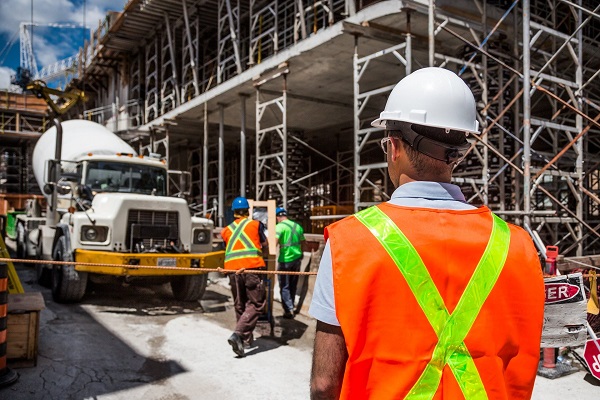Earning a master’s in construction management, one of the highest-paying master’s degrees, can prepare you for a career as a construction manager. Construction managers coordinate and oversee all aspects of a construction project throughout all five stages of building construction. A construction manager’s work commences in the initiation phase of construction and continues through the planning, execution, monitoring and completion phases.
The Initiation Stage
Not until relatively late in the process does any actual construction work get done. Even at the early stages of the project, though, a construction manager still plays an important role. The initiation stage of a construction project begins before the construction manager is even part of the team. At the start of the initiation stage, the person or company that is having the building constructed identifies the need for the construction project and decides to move forward with it. The early steps in the initiation stage of construction also include selecting, purchasing, and preparing the site on which the building will be assembled.
Towards the end of the initiation stage, the company that wants a building constructed will bring on a company or contractors to perform the work, including the construction manager. A construction manager considering a job offer should look at the specifics of what the client is looking for in the building and what challenges and opportunities are likely to arise. At this stage of the building process, these are big-picture considerations. The small details can be hammered out later in the process.
The initiation stage is also a good time to begin putting together the team of contractors who will be involved in the construction process so that you have clear scheduling and cost information to work with in the next stage of the process.
The Planning Stage
Now that the initial decisions are made, construction managers can begin planning the project in earnest. The planning stage encompasses planning the layout of the new structure, clarifying specifications, selecting building materials and more. This is also the phase of the construction process during which a lot of the more administrative duties of a construction manager are required. These duties include developing timetables for work completion and estimating the costs of materials, equipment and labor, according to the United States Bureau of Labor Statistics.
Today’s construction managers often do their planning with the help of computer software, such as cost estimation software, compliance software, computer-aided design software, scheduling software and specialized construction database software, O*NET reported.
The Execution Stage
Once the planning is complete, it’s time to execute those plans. At the execution stage, the actual construction work begins. This work may be done in stages, with different workers required for different aspects of the job. For example, wiring in a new construction is typically put in after the studs are in place but before sheetrock is installed. Since many parts of a construction project must be done in order—you can’t frame the walls of the house until after the foundation is poured, and you can’t put the roof on until there are walls to support it—not all aspects of the work will begin at the same time.
Throughout the execution of the project, all team leaders should be reporting their progress to the construction manager. Since so much of construction work must be done in a precise order, a delay in one area of work can hinder the entire effort.
The Monitoring Stage
IMAGE SOURCE: Pixabay, public domain
As construction begins, the construction manager’s focus shifts from the administrative aspects of planning to what’s going on at the job site. That’s not to say that the construction manager is no longer responsible for cost estimation and work timetables. The construction manager still has to address any delays and unexpected expenses to keep the project running smoothly, on time and within the amount budgeted. However, as the contractors and trades workers are actively performing their work, the construction manager oversees the job site and monitors the quality of the work being done.
The monitoring stage extends until the final steps of construction, including painting and fixture installation, are complete.
The Completion Stage
As the work on the building wraps up, the construction manager has to tie up all the loose ends. Often, final inspections are required before the building can be deemed safe and ready to use. Any debris, trash and spare materials left over at the end of the project should be cleared away. A construction manager may even be responsible for coordinating the landscaping around the new structure. The quality assurance aspect of the construction manager’s job is important in this stage. If any work is not done correctly and according to the contract with the client, the construction manager should identify it and have it resolved.
Completing the project may also involve administrative duties laid out in the contract with the client as well as ending any further shipments of building supplies and materials.
Additional Resources
What Is Construction Management?
What Kind of Daily Duties Are Involved in Construction Management?
Are There Certifications Needed to Work in Construction Management?

